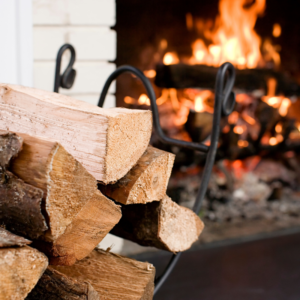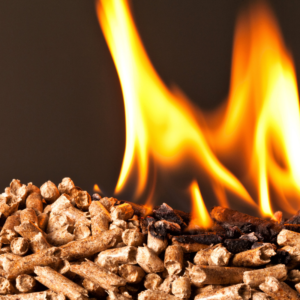Fireplaces are known for adding value to homes. In fact, it’s been shown that many people in the market for a new house are willing to pay more for one with a fireplace already in place! And it’s no wonder… fireplaces offer a cozy, warm, and welcoming aesthetic that’s hard to replicate, so it’s not surprising they’re on so many people’s home wish lists.
If you’ve made the decision to add a fireplace to your home, we’d love to help you out! Question is – what fuel type is right for you? Not sure? Let’s go over your options.
Wood: Pros & Cons
Pros
 Timeless/Classic Ambiance: There’s simply no denying that wood-burning options offer an ambiance that’s hard to match. Despite gas models looking more realistic than ever nowadays, you simply can’t beat the genuine smells and sounds that real fires produce.
Timeless/Classic Ambiance: There’s simply no denying that wood-burning options offer an ambiance that’s hard to match. Despite gas models looking more realistic than ever nowadays, you simply can’t beat the genuine smells and sounds that real fires produce.- Cheap, Renewable Fuel: We won’t be running out of wood anytime soon, and if it’s relatively cheap to obtain. (Even free, if you choose to season your own!)
- Operates During Outages: If you experience a power outage, this is one heating system that won’t be affected! And it’s a good way to guarantee heat for your home, no matter what the weather is doing outside.
Cons
- Time-Consuming Maintenance: Between chopping/storing/hauling wood, building fires, scooping out ash, putting fires out, and cleaning up any leftover wood chips that get left behind, wood-burning fireplaces require a lot more maintenance on the part of the homeowner.
- Not As Efficient: In terms of fuel types, wood-burning options won’t offer quite the efficiency as other options, such as gas. If you’re looking for the most heat possible, this probably isn’t the best route to take, as a lot of heat is lost up the chimney.
- Drafty: It’s not uncommon to experience some drafting issues with wood-burning systems, especially if you have a throat damper.
Gas: Pros & Cons
Pros
- Convenience: Gas excels when it comes to convenience. No hauling wood or spending time building and extinguishing fires. Just flip a switch or push a button, and you’re good to go! Not to mention, many come with remotes, so you can easily adjust the settings all from the convenience of your couch.
- Efficiency: Gas fireplaces are known for radiating a significant amount of heat into your living space. This is one category where most gas models take the cake!
- No Creosote: No burning wood means no creosote build-up! This means chimney fires won’t be something you’ll have to stress about.
- Flexible Placement Options: Gas fireplaces come with their own venting system, so you have more options in terms of placement throughout your home!
Cons
- Fuel Cost: In terms of cost savings, gas won’t be your cheapest route in terms of fuel.
- Loss of Ambiance: Since you aren’t burning real logs, and your system is sealed off with a glass front, it doesn’t give off quite that classic feel that so many crave in a fireplace.
Pellet: Pros & Cons
Pros
 High-Efficiency: Pellet systems are known for putting out the heat!
High-Efficiency: Pellet systems are known for putting out the heat!- Ease of Use: With pellet-fueled appliances, you simply load the hopper, sit back, and let the fuel automatically disperse by itself at regular intervals!
- Realistic Ambiance: Many opt for pellet appliances because they offer that realistic ambiance of burning wood, but don’t require the high levels of maintenance that a wood-burning option does.
- Cleaner Burns: Pellets are known for burning clean and for not giving off much smoke. The pellets also burn completely, for the most part.
Cons
- Requires Electricity: Unfortunately, pellet appliances require electricity, so they won’t offer much help in a power outage.
- Fuel Costs & Accessibility: Pellets aren’t always the most affordable or easy fuel to come by, so buying in bulk will always be your better option.
- Noisy: Pellet-fueled appliance are known for being a bit on the noisier side, as they run with a fan.
Electric: Pros & Cons
Pros
- Flexible Placement Options: With electric options, all you need is enough space and an outlet nearby, so you won’t be too limited in terms of placement. This also means that, should you eventually move, you can take your fireplace with you!
- No Chimney Required: Electric options don’t require a chimney, so you won’t need to invest in any huge reconstruction jobs.
- Affordability: In terms of initial costs and maintenance, electric options will almost always be the most affordable route to take!
- Easy to Operate: No building fires or dealing with stray sparks. Just flip a switch and you’re good to go!
Cons
- Fake Fires: Because there isn’t a real fire burning, you won’t get that same ambiance that a wood-burning system offers. (That said, today’s models are more realistic than ever.)
- No Help in Outages: Since electric fireplace require electricity to operate, they won’t offer any heat in a power outage.
Need Professional Care? We’re Here to Help!
No matter which type of system you’re looking for, we can help! We sell and install a variety of stoves, fireplaces, and inserts, all in a wide range of fuel types, and we would be happy to set you up right with the perfect fit for your needs.
Need to book maintenance? Regular professional care is key in keeping your system in tip-top shape, and we’d be happy to assist with it all. Schedule your next inspection now, or if you need repairs, spring and summer are the ideal seasons to get an appointment on the books!
Reach out today – we’re here for you!

Recent Comments